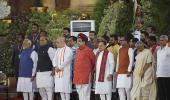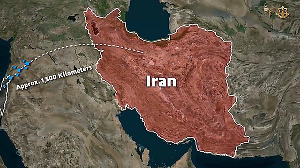'There might be some internal tussles that can be expected between any two persons in any party.'
'But I do not see any tussle which might weaken the possibility of dictatorship.'

Why did Uttar Pradesh, known as a Bharatiya Janata Party fortress, defeat the BJP this time?
Three eminent citizens of the state, who have been active in public causes all their lives, tell Jyoti Punwani about the discontent that media pundits missed.
The legendary Professor Roop Rekha Verma, former VC of Lucknow University and tireless fighter for secularism and women's rights, tells Jyoti why the results in UP, where the BJP suffered a humiliating loss of seats, make her happy, but not euphoric.
'There is nothing which makes us believe that the old guard will reform itself, that it will be a little shy of doing the horrendous things which they have done to the country and to its people, that they will start attending classes in the nursery of the democratic and pluralistic history of India," says Professor Verma.
The second of a three-part series:
- Muniza Khan: 'Fear Has Gone From People's Minds'
Did you expect these results in UP?
I wished for such results, not only in UP but in many other states too! But expecting so was difficult at that moment. Expectation is reasoned hope, and the reasons for hoping for such results looked very uncertain at that time.
Despite the ground reports of a desire for change, there were sufficient ifs and buts to douse one's hope.
In the last few elections, ground reports did not tally with the results. Many factors play a role in the actual outcome: Appreciation or disapproval converting into votes; voters' lists; actual vote counts; and above all the conduct of the Constitutional electoral and judicial institutions. There were solid grounds for the erosion of trust in these institutions.
Burdened with the past experiences of a decade, I felt like I was in a surrealistic world where every law and every institution could be openly subverted and there would be no door left to knock at.
In such a situation, one needs courage even to hope. And I admit that I did not have that courage. But, yes, there were increasing evidences to give an inkling of the possibility of a better mandate. And that gave some in civil society hope to keep working for a change.
What do you ascribe these results to?
Several things.
Foremost, an alternative narrative focusing on the common people's issues. The dominant narrative set by the present government was focused on religious identity and pitching these identities against each other.
This narrative flowered into several other divisive identities of geography, tribe, caste, etc. The intoxicating propaganda of conflict between these identities overshadowed the real miseries of life and succeeded in confusing the people in rationally prioritiSing their needs.
The alternative narrative launched by INDIA partly succeeded in clearing the fog and helped people set their priorities in a reasoned direction. It helped them to see through the game of divide and rule. It also helped them partly understand the changing face of a welfare State becoming a corporate state.
Also, the Alliance maintained its bonds skillfully, despite very many tricks to break it. This gave hope to people because the Alliance appeared trustworthy.
Another reason seems to have been that the Alliance appeared as a collective which would have internal checks and balances, whereas on the other side there was mostly one individual alone, Mr Modi, who was neither consistent nor relevant to the real problems of the masses.
On the contrary, the leaders of Alliance, specially Rahul Gandhi and Akhilesh Yadav, sounded sincere and well-meaning.
In addition, this time, civil society was a little more active on the ground than on previous occasions.
These results came as a surprise to most of the media; even psephologist Yogendra Yadav didn't predict such a defeat. Is it that people didn't speak to the media?
It is almost impossible for anyone to be precise on such matters, especially when the field of investigation is vast and complex. I received hundreds of videos of very poor people from different backgrounds describing how their lives were destroyed by Mandir-Masjid politics. The so-called mainstream media no more reaches such segments of the public. It is the cluster of alternative media which is free from the stranglehold of the government, but has a smaller reach, that exposes the more authentic reality.
The people were willing to talk. Only, the media had to find them.

Rajnath Singh's victory margin has also been greatly reduced in Lucknow. Any reason for the fall in his popularity?
I think it was the air of new hope generated by the Alliance, specially its welfarist manifesto, plus the pro-people promises and narratives, which presented a good challenge to most of the BJP candidates in UP.
The duo of Rahul-Akhilesh were almost charismatic. Also, their narrative and promises sounded more meaningful than the BJP's.
This has to be seen in the context of the BJP's consistently broken promises and their overconfidence, resulting in total neglect of people's voices.

What's the atmosphere like in Lucknow after the result? Is it relief, do ordinary people, and also grassroots activists, feel they can breathe?
Sadly no. Because there is no change in the government either at the state level or at the Centre.
The results have been better but not radical enough to throw out the present government. There is nothing which makes us believe that the old guard will reform itself, that it will be a little shy of doing the horrendous things which they have done to the country and to its people, that they will start attending classes in the nursery of the democratic and pluralistic history of India.
So, no breathing space for activists yet. The costs of activism and expressing people's Mann ki Baat are likely to remain high and deep.
How real is the Yogi-Modi rift?
To me it seems to be only a bogey. There might be some internal tussles and power strife that can be expected between any two persons in any party or group. But I do not see any tussle which might weaken the possibility of fascism and dictatorship. Both have grown in the same kind of nursery and both strengthen each other's agenda.

Do you think the Samajwadi Party will be able to act as an effective Opposition?
Yes, I do think that the SP can play the effective role of the Opposition in UP. To keep getting people's support, the leaders will have to be watchful on several fronts.
A. They must keep their flock together. There will be every effort to break the party and buy the members' loyalty.
B. They must ensure that their new MPs keep nurturing their constituencies and do not disrupt their contact with the masses.
C. In the assembly as well as in Parliament, they must continue to fight for the rights of the poor, the marginalised, Dalits, minorities and women.
- Part 3 of the series: 'It was a people's election'
Feature Presentation: Aslam Hunani/Rediff.com










